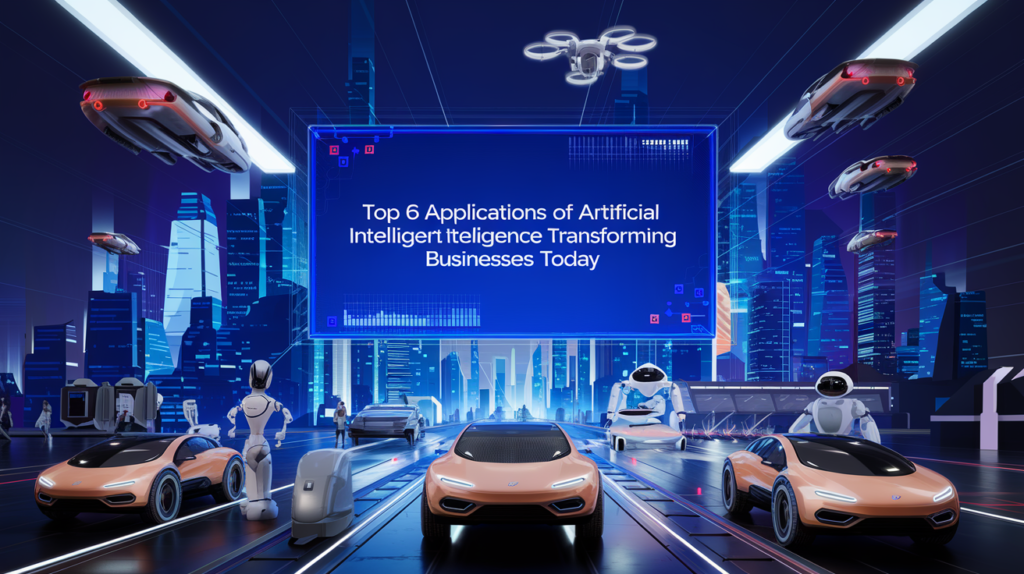As businesses navigate an increasingly digital landscape, Artificial Intelligence (AI) is emerging as a game-changer, driving unprecedented transformation across industries. AI’s ability to process vast amounts of data, recognize patterns, and make intelligent decisions is revolutionizing how companies operate, interact with customers, and compete in the market. From automating routine tasks to providing deep insights that inform strategic decision-making, AI offers a wealth of applications that can enhance productivity, improve customer satisfaction, and ultimately drive growth.
This blog post will explore the top 6 ways AI is being applied in businesses today. We’ll delve into how AI is used to streamline processes, improve customer experiences, and optimize resources across various sectors. Whether you’re an entrepreneur, a manager, or simply curious about how AI is shaping the future of business, these applications will highlight the ways in which AI is rapidly becoming a vital tool in the modern business arsenal.
1- Customer Service Automation
Artificial Intelligence is revolutionizing customer service by enabling businesses to provide responsive, personalized, and efficient support through AI-driven chatbots and virtual assistants. These tools offer 24/7 assistance, handling tasks such as answering FAQs, processing transactions, and resolving issues, which allows human agents to focus on more complex inquiries. By utilizing data on past interactions and customer preferences, AI delivers tailored experiences that enhance satisfaction and foster loyalty. Companies across various sectors such as e-commerce and finance have successfully integrated AI to streamline customer service operations, improve response times, and elevate the overall customer experience.
2- Sales Forecasting
Artificial Intelligence is transforming sales forecasting by leveraging predictive analytics to project sales trends with remarkable accuracy. By analyzing historical data and current market conditions, AI algorithms can identify patterns and predict future sales, enabling businesses to optimize their strategies and inventory planning. This proactive approach allows companies to adjust marketing campaigns, manage stock levels, and align resources based on anticipated demand, ultimately improving efficiency and profitability. Numerous organizations, particularly in retail and manufacturing, have harnessed AI-driven forecasting tools to enhance decision-making and maintain a competitive edge in their respective markets.
3- Marketing Personalization
Artificial Intelligence is driving a new era of marketing personalization by enabling businesses to create highly targeted advertising and content recommendations tailored to individual customer preferences. Through advanced customer segmentation and behavioral analysis, AI tools can identify specific audience segments and predict customer interests, allowing marketers to deliver relevant and timely messages across multiple channels. These AI-driven insights help businesses enhance customer engagement, improve conversion rates, and boost overall brand loyalty. Leading marketing platforms now incorporate AI capabilities to empower companies to personalize customer interactions at scale, making marketing efforts more efficient and effective.
4- Inventory Management
Artificial Intelligence is reshaping inventory management by enabling real-time tracking and accurate demand forecasting. Through AI-powered tools, businesses can monitor inventory levels continuously, predict demand fluctuations, and optimize stock based on data-driven insights. This level of precision reduces the risk of stockouts and overstocking, minimizing waste and ensuring that the right products are available at the right time. By integrating AI into their supply chain operations, companies can streamline inventory management, improve efficiency, and reduce costs, ultimately leading to a more agile and responsive business model.
5- Process Automation
Artificial Intelligence is significantly enhancing process automation, particularly through Robotic Process Automation (RPA), which streamlines repetitive tasks across various business functions. By automating routine activities such as data entry, invoice processing, and report generation, organizations can reduce operational costs and minimize human error, leading to increased efficiency and productivity. Industries such as finance, healthcare, and manufacturing are leveraging RPA to optimize their processes, allowing employees to focus on more strategic initiatives that require human judgment and creativity. The integration of AI into process automation not only accelerates workflow but also improves accuracy and compliance, providing businesses with a competitive advantage in today’s fast-paced environment.
6- Fraud Detection and Prevention
Artificial Intelligence plays a critical role in fraud detection and prevention by utilizing advanced algorithms to identify suspicious activities and patterns that may indicate fraudulent behavior. In the finance and banking sectors, AI systems analyze vast amounts of transaction data in real time, flagging anomalies and providing alerts for further investigation. These AI-driven solutions enhance security by continuously learning from new data and adapting to emerging fraud tactics, making them increasingly effective over time. For instance, financial institutions employing AI technologies have reported significant reductions in fraud losses and improved response times to potential threats, demonstrating the effectiveness of AI in safeguarding sensitive information and maintaining trust in financial transactions.
In summary, the integration of advanced technology into business operations is transforming how organizations function across various sectors. From automating customer service and sales forecasting to enhancing inventory management and fraud detection, these applications are driving efficiency, improving customer experiences, and providing valuable insights for strategic decision-making. As businesses continue to adopt these technologies, they gain a competitive edge, enabling them to navigate the complexities of the modern marketplace.
Embracing these innovations is not merely a trend; it is essential for businesses aiming to thrive in an increasingly digital world. Organizations that leverage these capabilities will not only optimize their processes but also position themselves for sustained growth and success in the future. As the landscape of business continues to evolve, those who harness advanced technologies will be better equipped to meet customer demands, adapt to market changes, and secure their place in the competitive arena.
